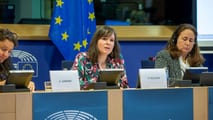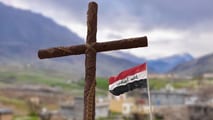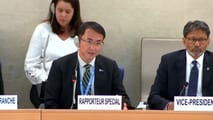ECLJ to the UN: Egypt Must Legalize Conversion from Islam to Christianity
January 25, 2010
(Strasbourg, France) — The European Centre for Law and Justice (ECLJ) - an international affiliate of the American Center for Law and Justice (ACLJ) - has submitted a critical case to the United Nations Special Rapporteur on Freedom of Religion urging Egypt to legalize conversion from Islam to Christianity in accordance with International Human Rights standards. The ECLJ submitted the case January 22nd on behalf of Mohammed Bishoy Hegazy v. The Arab Republic of Egypt.
A copy of the filing is available here.
Hegazy, whose case and plight have gained international attention, is the first Egyptian convert from Islam to request legal recognition of his conversion in Egypt. Born in 1982, he converted to Christianity in 1998. Shortly after his conversion to Christianity, Egyptian police tortured him for three days and harassed him several times thereafter. In 2001, he was arrested for publishing a book of poems critical of the Egyptian state security police and the following year he was arrested and held for ten weeks in what some have described as 'concentration camp' conditions.
In early 2007, Hegazy attempted to register his change of religion with the Egyptian Interior Ministry, but Ministry officials rejected his request. In August 2007, Hegazy filed a case requesting official recognition of his conversion and to have the details on his identity card changed to reflect his new religious beliefs. Hegazy chose to file suit because he and his wife were expecting a child, who they would be legally required to raise as a Muslim unless they officially converted from Islam to Christianity. Hegazy and his wife wanted their child to be born a Christian, from Christian parents, so that their child could have a Christian name, receive a Christian education, and marry in a church. Mr. Hegazy stated, "I think it is my natural right, to embrace the religion I believe." Hegazy also stated that he brought the suit to establish a precedent upon which other Christian converts could rely.
When Hegazy filed his case, two academics from Al-Azhar University demanded his execution, and the minister for religious endowments publicly affirmed the legality of executing Muslims who convert to Christianity. Hegazy was then forced into hiding after extremists surrounded his former house for several days and set fire to his neighbor’s residence, killing the female occupant (who was his wife’s best friend).
In January 2008, the Supreme Administrative Court ruled against Hegazy, basing its ruling on Article 2 of the Egyptian Constitution and Sharia law. Hegazy and his family remain in hiding, and are unable to leave the country, having been denied the necessary passports. Hegazy’s Egyptian attorneys received death threats from various sources. Currently, Hegazy is represented by Ashraf Edward in Egypt and ECLJ representatives outside Egypt.
According to Dr. Grégor Puppinck, the director of the ECLJ: "This case will have a remarkable impact and affect every Egyptian who leaves Islam and converts to another religion. It is our hope that those who want to see religious freedom can do so without fear of being harmed. It is time for Egypt to recognize the legality of those who desire to convert from Islam to Christianity. Since Egypt plays such a pivotal role in influencing other Islamic countries, it's important that those who choose to leave Islam and accept another religious affiliation are permitted to do so in accordance with international human rights standards."
In its complaint, the ECLJ argued that Egypt’s "one-way conversion policy" - allowing only conversion to Islam, violates religious freedom rights enshrined in the international covenant on civil and political rights. In particular, the ECLJ asserts that this conversion policy directly violates the freedom to adopt, change, or renounce, a religion or belief and the right of parents to ensure the religious and moral education of their children, as proclaimed and guaranteed by international law.
The ECLJ also insisted that Egypt’s recognition of Islam as the state religion should not be a pretext to violate rights of non-Muslims. Whereas article 46 of the Egyptian Constitution guarantees officially freedom of religious belief and religious exercise, the violation of Human Rights and the rights of non-Muslims stems from article 2 of the Constitution which states that "the principle source of legislation is Islamic jurisprudence (Sharia)". Therefore, the Egyptian Supreme Constitutional Court has interpreted this provision to mean that no legislation can violate Sharia law.
The U.N. Special Rapporteur on Freedom of Religion or Belief will now directly question the Egyptian Government on this specific situation, initiating the process of review of Egyptian’s legislation on conversion.
In the weeks ahead, the ECLJ will continue to defend and promote the rights of the Egyptian Christians through the U.N. "Universal Periodic Review" (UPR) human rights mechanism. Through it, the Human Rights Council will review the fulfillment by Egypt of its human rights, obligations, and commitments. The UPR is a cooperative mechanism, based on an interactive dialogue with the State under review. Non-governmental organizations (NGOs) accredited to the ECOSOC such as the ECLJ are entitled to participate to this process.
The UPR working group will review the actions of Egypt during its session scheduled for February 17-19, 2010. Three States (China, Madagascar and Italy) are in charge of drafting the Report on Egypt. That report will then be considered, discussed, and voted upon before the Human Rights Council in June 2010.
The European Centre for Law and Justice (ECLJ) is an international law firm focusing on the protection of human rights and religious freedom in Europe and worldwide. The ECLJ is affiliated with the American Center for Law and Justice (ACLJ) which focuses on protecting religious freedom in the United States. Attorneys for the ECLJ have served as counsel in numerous cases before the European Court of Human Rights. Additionally, the ECLJ has special Consultative Status with ECOSOC of the United Nations, and is accredited to the European Parliament.









